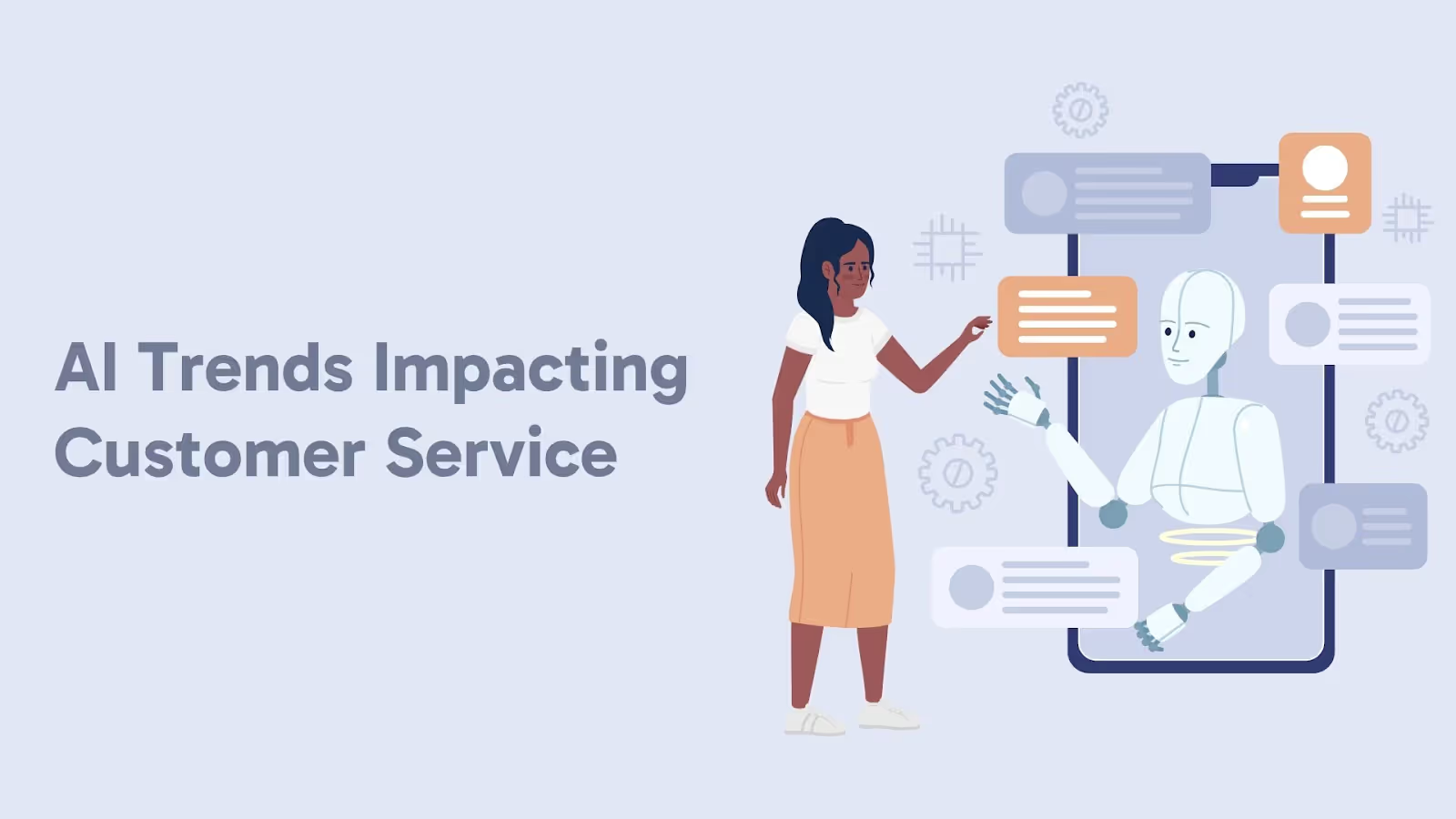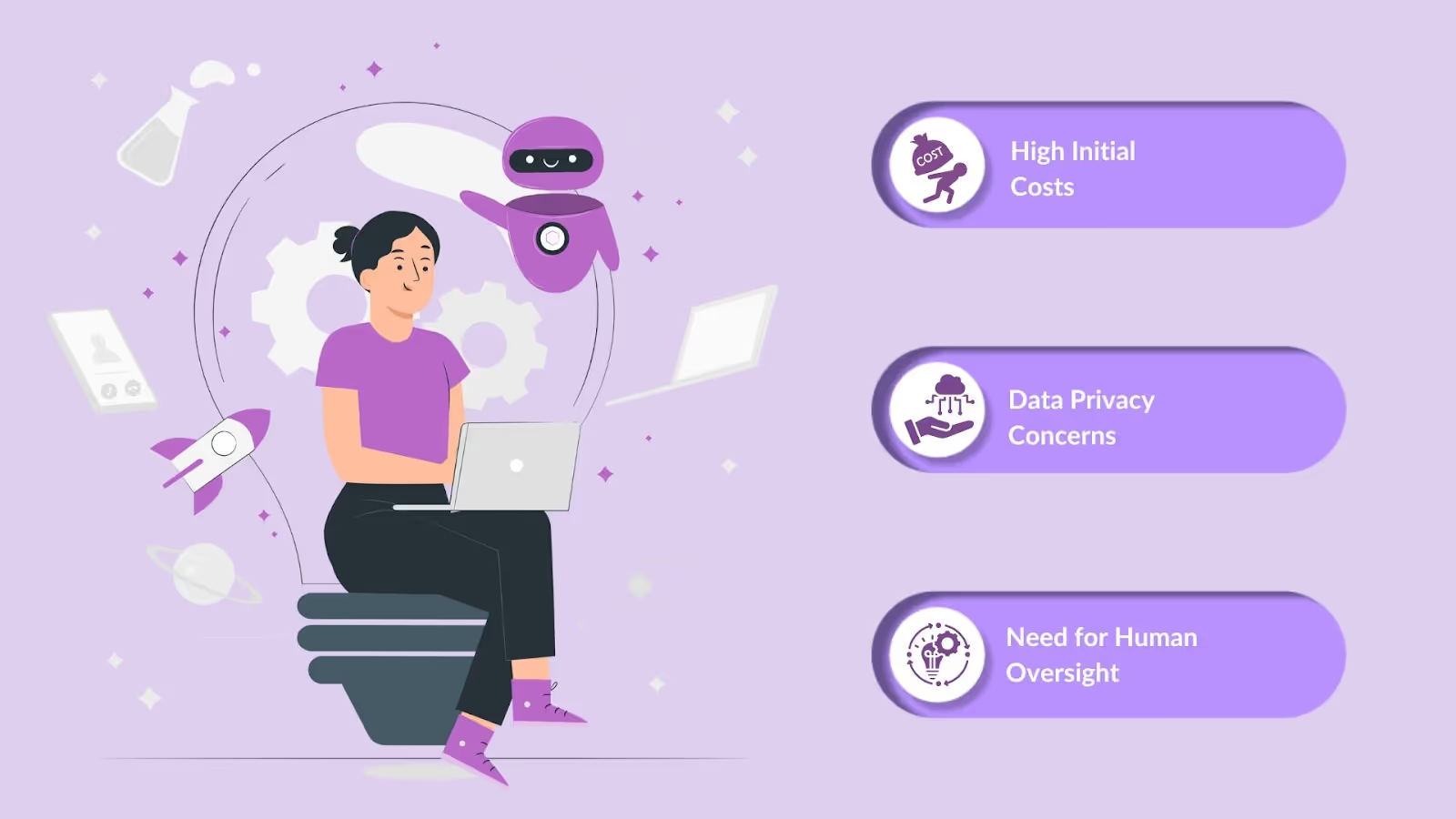AI Trends Impacting Customer Service in 2024


Don’t miss what’s next in AI.
Subscribe for product updates, experiments, & success stories from the Nurix team.
AI Trends Impacting Customer Service in 2024
As businesses face rising customer expectations, AI trends in customer service have become integral to delivering faster, more personalized, and more efficient support. By 2024, AI's role in customer service will continue to grow, enhancing every aspect of the customer journey from initial inquiry to resolution.
This blog will explore the benefits of AI in customer service, dive into 7 AI trends in customer service, examine AI's role in enhancing human agents' productivity, and discuss real-world examples, challenges, best practices, and interactive tools that AI has revolutionized.
Benefits of AI in Customer Service
The benefits of AI in customer service are undeniable, as AI has proven to significantly improve the speed, efficiency, and personalization of customer interactions. Let's break down the key advantages:
- Faster Response Times and 24/7 Availability
One of the biggest AI trends in customer service is AI systems, such as chatbots and virtual assistants, can respond to customer queries instantly. These AI tools are available 24/7, so customers can get help anytime, whether tracking an order or helping with an account. For example, Amazon uses AI chatbots to help with order queries, reducing wait times.
- Cost Reduction
AI takes the operational load off customer service teams by automating repetitive tasks. For example, AI can handle routine queries so that human agents can focus on complex or emotional issues. This means businesses can save on staff costs and maintain high service standards, a big AI in customer service benefit.
- Scalability Without Compromise
With AI, businesses can handle more customer interactions without sacrificing service quality. AI chatbots and virtual assistants can handle multiple conversations at once, so companies can scale up during peak periods without service disruption. This is a crucial AI trend in customer service so businesses can grow without service interruption.
- Personalized Customer Interactions
Personalization is one of the biggest AI trends in customer service. AI systems can analyze customer data such as browsing history or previous interactions to deliver tailored responses or product recommendations. Netflix, for example, uses AI to recommend content based on user preferences, increasing customer satisfaction and engagement.
In summary, the benefits of AI in customer service are quicker response times, cost savings, scalability, and hyper-personalized customer interactions. As AI continues to grow, these will be key to the future of customer service. Next, we'll look at the 7 AI trends in customer service that are changing the industry.
7 AI Trends in Customer Service

The following AI trends in customer service are set to dominate in 2024, transforming how businesses engage with their customers:
- Total Experience (TX) Integration
Total Experience (TX) is where Customer Experience (CX), User Experience (UX), and Employee Experience (EX) all come together to provide a seamless experience across channels. AI is critical to this trend by ensuring consistency and personalization across all touchpoints. With AI-powered solutions, companies can delight both customers and employees.
- Hyper-Personalization with AI
AI-driven hyper-personalisation is one of the top AI trends in customer service. AI algorithms can analyze customer behavior and deliver personalized responses and recommendations. Amazon does this well by using AI to suggest products based on browsing history and see a significant increase in conversion rates and customer loyalty.
- Proactive Customer Service Powered by Predictive Analytics
Predictive analytics allows businesses to offer proactive customer service. By analyzing past behavior and identifying patterns, AI can predict potential issues before they happen. This trend is significant for industries like telecoms and retail, where addressing problems early can improve the customer experience.
- AI-Driven Emotional Intelligence (EQ)
Emotional intelligence is critical to creating human-like interactions in customer service. AI systems with sentiment analysis can analyze the emotional tone of customer messages and respond accordingly. This trend means AI in customer service resolves issues and does so with empathy.
- Self-Service Tools Powered by AI
Self-service is on the rise, with customers wanting instant solutions. AI-powered tools like chatbots, FAQs, and knowledge bases allow customers to resolve issues independently. For example, Domino's Pizza uses AI-driven self-service tools to streamline the ordering process and give customers real-time updates and a seamless experience.
- AI and Data Privacy Compliance
As AI systems collect and analyze vast amounts of customer data, ensuring compliance with privacy regulations like GDPR is crucial. Companies must prioritize data security while delivering personalized experiences, balancing customization, and protecting customer information.
- AI Integration with Voice Assistants
Voice-activated customer service driven by AI is on the rise, with assistants like Amazon Alexa and Google Assistant giving hands-free interaction. This trend concerns accessibility and convenience, especially in industries like retail and healthcare, where fast and hands-free service is critical.
In conclusion, these 7 AI trends in customer service are shaping the future of customer support by improving personalization, scalability, and emotional intelligence. As these trends continue to evolve, businesses that adopt them will be better positioned to meet the changing demands of their customers.
Real-World Examples of AI in Customer Service
Companies across various industries are successfully implementing AI in customer service, demonstrating how AI can enhance both efficiency and customer satisfaction:
- Netflix
Netflix uses AI algorithms to recommend personalized content based on users' viewing habits. This hyper-personalization helps retain viewers and increases engagement, as users consistently offer relevant and engaging content.
- Amazon
Amazon's AI-driven chatbots handle routine customer services inquiries, such as order tracking and returns. By automating these tasks, Amazon reduces response times and frees up human agents to handle more complex customer issues
- Domino's Pizza
Domino's virtual assistant, Dom, automates the ordering process, allowing customers to place orders and receive updates in real time. This use of AI streamlines operations while improving the customer experience
These real-world examples illustrate the powerful impact of AI trends in customer service, showcasing how businesses can leverage AI to deliver more efficient and personalized customer support.
Challenges of Implementing AI in Customer Service

Despite the many benefits, there are several challenges businesses face when integrating AI into customer service:
- High Initial Costs
Implementing AI systems for customer service can be expensive, requiring significant upfront investments in technology and infrastructure. Businesses must consider whether the potential long-term cost savings outweigh these initial costs.
- Data Privacy Concerns
Data privacy is a big issue when AI systems collect and process data. Comply with data protection regulations like GDPR to avoid legal headaches and customer mistrust.
- Need for Human Oversight
AI is great at automating the mundane but struggles with complex or emotional issues. It would help if you found the balance between automation and human intervention to keep customer service human and reactive.
Overcoming these challenges is key to fully leveraging the power of AI trends in customer service. By addressing cost, privacy, and the need for human oversight, businesses can unlock AI’s potential while maintaining trust and efficiency.
Best Practices for Implementing AI in Customer Service
To effectively integrate AI into customer service, businesses should follow these best practices:
- Start with Chatbots for Basic Inquiries
Rather than overhauling their entire system, businesses should start small by deploying chatbots to handle simple inquiries. This gradual implementation allows companies to test AI's effectiveness before scaling.
- Ensure Continuous AI Learning
AI systems require continuous updates to remain effective. By regularly feeding AI systems with new data, businesses can improve the accuracy of AI-driven responses and enhance the customer experience.
- Combine AI with Human Agents
AI should work with human agents, automating the mundane and allowing humans to handle the complex. This combination of automation and human touch is critical to excellent customer service.
By following these best practices, businesses can maximize the potential of AI trends in customer service, ensuring they optimize both automation and the human element to deliver superior service experiences.
AI's Role in Enhancing Human Agents' Productivity
AI enhances human agents' productivity by providing real-time insights, automating repetitive tasks, and supporting multitasking, ultimately allowing agents to focus on more critical customer interactions.
1. AI-Assisted Insights
During live conversations, AI provides customer data, previous interactions, preferences, and behavior. Agents can respond faster and more accurately and deliver highly personalized and relevant solutions. Agents don't have time to search for information, so they're more efficient and customer-happy.
2. Automating Repetitive Tasks
AI automates routine inquiries like processing returns, updating accounts, or answering FAQs, allowing human agents to concentrate on complex issues that require emotional intelligence or in-depth problem-solving. This reduces response times and ensures customers receive faster, more effective resolutions.
3. Multitasking Support
AI systems help human agents handle multiple customer conversations simultaneously without compromising service quality. AI can handle the simple stuff in the background, while agents focus on high-priority or more complex conversations.
In conclusion, AI in customer service improves automation and empowers human agents by streamlining their workflows, making interactions more efficient, meaningful, and tailored to individual customer needs.
Conclusion
AI trends in customer service in 2024, will be about hyper-personalization, proactivity, and seamless AI integration. Businesses using AI, like Amazon and Netflix, already see faster response times, cost savings, and scalability. However, data privacy and balancing automation and human agents are critical to long-term success.
That's where Nurix AI comes in. By implementing Nurix AI, your business can deliver 24/7 customer support, hyper-personalized experiences, and efficient service, all while freeing human agents to focus on complex queries. Nurix AI blends advanced automation with human empathy, ensuring your customer service stays ahead of the competition. Get in touch with us!

Don’t miss what’s next in AI.
Subscribe for product updates, experiments, & success stories from the Nurix team.









